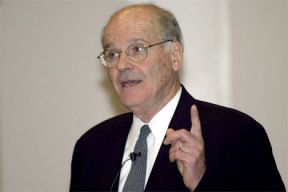Though judge selection and the growing concern about rising campaign spending on judges’ campaigns was supposed to be the topic for a speech by the state’s highest judicial official Thursday, Supreme Court Chief Justice Gerry Alexander had something else on his mind: the paltry pay that people get when called to serve on jury duty.
“This is something I’m very passionate about,†the chief justice told roughly 65 attendees at a League of Women Voters luncheon at Freeland Hall Thursday.
Forcing counties and municipalities to pay low fees to jurors is “a real embarrassment, in my opinion,†Alexander said.
Enacted by the state back in 1959, towns and counties are authorized to pay a minimum of $10 to $25 per day — most, including Island County, pay $10 plus mileage, plus lunch if the jury is sequestered.
While that may have been a good rate then, Alexander said, it’s not much now, thanks to inflation.
What’s more, the low daily rate has made it more difficult to fill out jury panels. Many people summoned bring up excuses why they can’t serve — and others just don’t show up at all. And though bailing on jury duty is a misdemeanor, Alexander noted that judges are reluctant to take action.
“Judges have a heart and don’t want to unduly burden otherwise upstanding citizens,†he said.
Alexander said serving on a jury can be a financial stretch for some. He noted that many single mothers can ill afford child care at $10 a day and parking rates in cities can use up that amount in three hours. “It just isn’t fair,†he said.
A related problem revolves around the diversity of the jury pool.
If most jurors are wealthy or retired, defendants could be denied due deliberation by people more their peers.
Here in Island County, potential jurors are drawn from lists of registered voters and people with driver’s licenses.
Over the last few years, the Board of Judicial Administration, which sets Washington judicial policy, has been recommending the state increase the amount of jury fees.
Alexander thinks paying at least the minimum wage ($7.63 per hour, or $61 a day) is reasonable. And he pulled out a copy of a commission report that underscored the need for an increase.
“Citizens should be fairly compensated,†Alexander read the report to the League crowd.
Alexander added that decision makers in Olympia have been pressed to raise the fees, but by starting out small.
“We want the Legislature to appropriate $500,000 for a pilot program in two or three counties and see how it goes,†he said.
Alexander said that the full program would not be that expensive, considering the overall amount of state spending.
“The amount would be viewed in Olympia as budget dust,†he said.
The state has been devoting more money to the courts. In the last 12 months, the Board of Judicial Administration has succeeded in getting the Legislature to invest more for public defenders, as well as underwriting costs for indigent parents and increasing money for district court judges.
Alexander is confident that the state will eventually step in to help jurors earn more for their civic service.
“This would reverse a long trend of putting the financial burden on the counties,†he said. “And that would be a very good thing.â€



